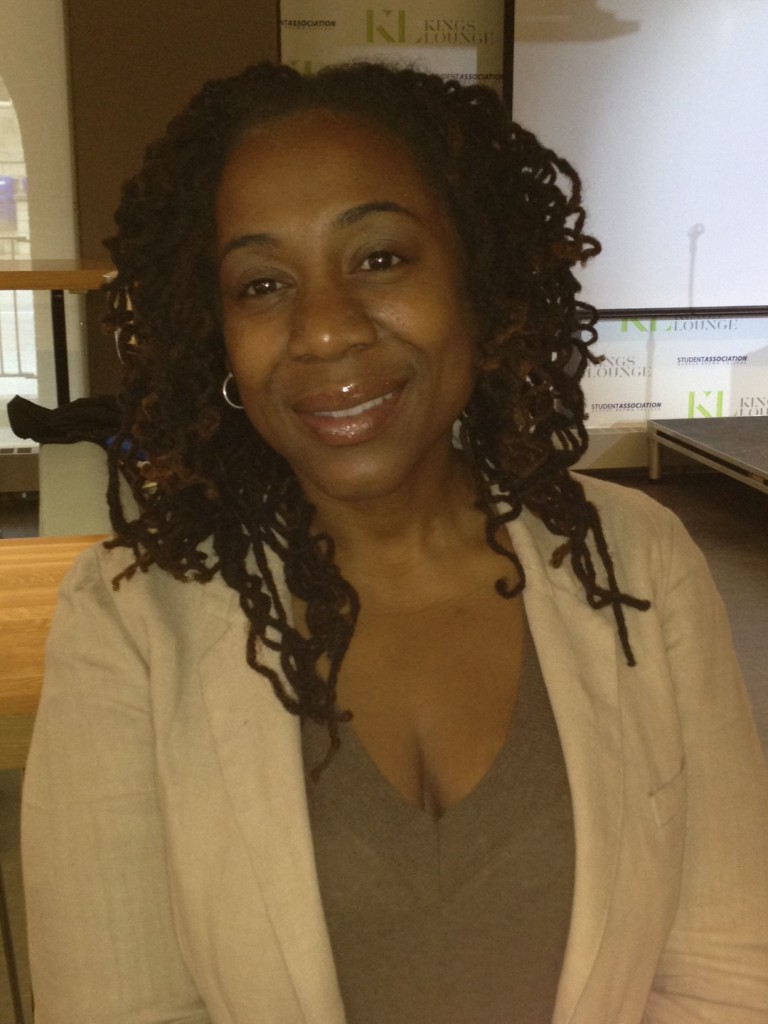By Cassandra Thompson
Special to The Dialog

Trey Anthony visits GBC for Xpressions against Oppression week in February, 2013. Photo: Cassandra Thompson / The Dialog
We must tell our stories; the way we experience and navigate the daily occurrences that salt and pepper our lives. So often we find our stories being told by those who do not understand the nuances of varied experiences, or shall we say, experiences that do not mimic their own.
This was a realization Trey Anthony, the dynamic playwright, producer, director, actor, and motivational speaker had when she began pursuing her acting career. “Baby Mama #1” and “Crackhead #3” were only a couple of the stereotypical, black female roles her agent often found for her to audition for.
This left her feeling unfulfilled, and frankly angered, by the way in which an industry and art form she had come to love was telling young black kids that they could only be visible in the low-income, un-educated, down-trodden roles that mainstream Canada had become used to seeing the community in.
There is so much beauty, success, positivity, and inspiration that is generated in the black community and Anthony wanted to share this with Toronto, especially with the black women of Toronto, who were far more multifaceted than had ever been discussed on stage or on screen – it is from her anger from seeing her community members being misrepresented in mainstream media and the urge to have her story, and the stories of all black women told, that ‘Da Kink in My Hair,’ the internationally recognized play and television series, was born.
“We have to ask ourselves, who is speaking for who?” said Anthony. “Often we discredit or silence others when an experience is not our ours; until we resonate with the issue, we won’t care to represent it truthfully.”
Now on a truth-telling quest, Anthony is in schools encouraging other youths to tell their stories, bringing an interactive workshop, ‘Da Streets to Da Ear,’ to black youth so that they may share their experiences of having to navigate the predominately Eurocentric spaces in Canada today.
Anthony is also currently working on producing her next play, Black Mothers Don’t Say I Love You, which discusses the legacy left by emigration, and the emotional constraints faced when a mother must part from her child to create opportunity for herself in a new land.
“It speaks about forgiveness and the process of mothering,” said Anthony. Uniquely discussing learned behaviours as a factor in human interactions, no matter how ‘instinctual’ the learned behaviours are expected to be. It will be opening February 2014 at the Living Arts Centre.
Anthony encourages us to look to ourselves for satisfaction and has started an initiative with spoken word artist Jemini to show young, black women how to love themselves and live for themselves; something we are not encouraged to do as black women. It is through this initiative that she hopes to continue to encourage all of us to tell our stories and find pride in our lived realties and individual truths.
Anthony and Jemini’s self-love movement can be found at www.blackgirlinlove.com, and find her work and production company at www.treyanthonystudios.com.

